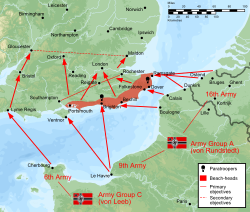Operation Sea Lion
| Operation Sea Lion | |
|---|---|
| Part of the Western Front of the Second World War | |
 |
|
| Operational scope | Normandy, the Belgian coast line, the English Channel and the English coast line from Kent to Dorset, Isle of Wight and parts of Devon, but principally in Sussex and Kent |
| Planned | September 1940 |
| Planned by | OKW |
| Objective | Elimination of the United Kingdom as a base of military operations against the Axis Powers |
| Outcome | Eventual cancellation and diversion of German and Italian forces for Operation Barbarossa |
Operation Sea Lion (German: Unternehmen Seelöwe) was Nazi Germany's code name for a provisionally proposed invasion of the United Kingdom during the Battle of Britain in the Second World War. Following the Fall of France, the Nazis expected the British to seek a peace agreement, and invasion was considered as a last resort only if all other options failed. As a precondition, the operation would have required both air and naval superiority over the English Channel and proposed landing sites, neither of which the Germans ever achieved during the war. A large number of ill-suited barges were gathered together, but Sea Lion was postponed indefinitely on 17 September 1940 and never carried out. The German High Command had little confidence in the plan's feasibility, and most historians agree it had little possibility of success.
Hitler hoped for a negotiated peace with Britain, and made no preparations for amphibious assault on Britain until the Fall of France. At the time, the only forces with experience of or modern equipment for naval landings were the Japanese, at the Battle of Wuhan in 1938.
In September 1939 the German invasion of Poland was a success, but this infringed on both a French and a British alliance with Poland, and both countries declared war on Germany. On 9 October his "Directive No. 6 for the Conduct of the War" planned an offensive to defeat these allies and "win as much territory as possible in Holland, Belgium, and northern France to serve as a base for the successful prosecution of the air and sea war against England".
With the prospect of the Channel ports falling under Kriegsmarine (German Navy) control and attempting to anticipate the obvious next step that might entail, Grand Admiral (Großadmiral) Erich Raeder (head of the Kriegsmarine) instructed his operations officer, Kapitän Hansjürgen Reinicke, to draw up a document examining "the possibility of troop landings in England should the future progress of the war make the problem arise". Reinicke spent five days on this study and set forth the following prerequisites:
...
Wikipedia
